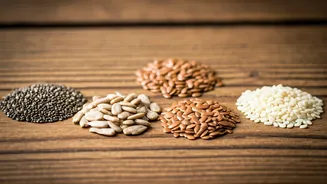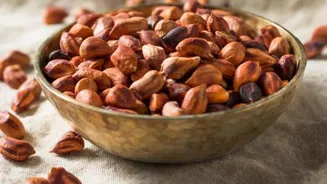Chia Seeds
Chia seeds, tiny yet mighty, are a fantastic source of omega-3 fatty acids, fiber, and antioxidants. These nutrients work in synergy to reduce LDL (bad)
cholesterol and increase HDL (good) cholesterol levels. The high fiber content aids in binding cholesterol in the digestive tract, preventing its absorption. Incorporating chia seeds into your diet is simple: sprinkle them on your cereal, add them to smoothies, or mix them into yogurt. A daily intake of about 1-2 tablespoons can provide significant benefits. Besides heart health, chia seeds can also contribute to weight management by promoting a feeling of fullness. Consider that these seeds are an easy addition to meals, offering a simple yet effective way to protect your heart.
Flax Seeds
Flax seeds are another excellent choice for heart health, loaded with omega-3 fatty acids, fiber, and lignans. Similar to chia seeds, flax seeds' fiber helps reduce cholesterol absorption. Lignans are plant compounds with antioxidant properties, providing added benefits. To maximize the absorption of nutrients, it's best to consume flax seeds ground. You can grind whole seeds using a coffee grinder or buy them pre-ground. Add a tablespoon or two to your morning oatmeal, salads, or baked goods. Regular consumption of flax seeds is associated with lower blood pressure and improved cholesterol profiles. Remember to store ground flaxseeds in an airtight container in the refrigerator to prevent rancidity.
Hemp Seeds
Hemp seeds, also known as hemp hearts, offer a complete protein source along with essential fatty acids. They are rich in both soluble and insoluble fiber, which contributes to lowering cholesterol levels. Hemp seeds have a favorable omega-6 to omega-3 ratio, crucial for heart health and reducing inflammation. These seeds can be eaten raw, added to smoothies, or sprinkled on salads and other dishes. They have a mild, nutty flavor that complements various foods. Regularly including hemp seeds in your diet supports cardiovascular wellness. A typical serving size is around 2-3 tablespoons per day, providing a boost of nutrients without significantly altering your diet.
Pumpkin Seeds
Pumpkin seeds are packed with nutrients, including magnesium, zinc, and healthy fats, all of which benefit heart health. Magnesium helps regulate blood pressure, while zinc plays a vital role in maintaining overall health. The healthy fats found in pumpkin seeds, such as omega-6 fatty acids, help improve cholesterol levels and reduce inflammation. Pumpkin seeds can be enjoyed as a snack, added to salads, or incorporated into various recipes. Roasting them lightly enhances their flavor, making them a delicious and nutritious option. Incorporating pumpkin seeds into your diet offers a delicious way to support a healthy heart.
Sunflower Seeds
Sunflower seeds provide vitamin E, magnesium, and other essential nutrients that contribute to heart health. Vitamin E acts as an antioxidant, protecting cells from damage, while magnesium helps regulate blood pressure. These seeds are also a good source of fiber, which helps lower LDL cholesterol. Sunflower seeds can be eaten raw or roasted and added to salads, cereals, or trail mixes. Their mild, nutty flavor makes them versatile and easy to include in your meals. Consuming sunflower seeds regularly supports a healthy heart and overall well-being. A handful of sunflower seeds daily can make a positive impact.
Sesame Seeds
Sesame seeds are a rich source of nutrients, including fiber, healthy fats, and lignans, all of which contribute to cardiovascular health. The fiber helps to reduce cholesterol levels, while the lignans possess antioxidant properties. Sesame seeds also contain compounds that can help lower blood pressure. You can add sesame seeds to your diet by sprinkling them on salads, using them in stir-fries, or incorporating them into baked goods. Tahini, a paste made from sesame seeds, is another delicious way to enjoy their benefits. Regularly consuming sesame seeds can significantly contribute to supporting your heart health. Making small, consistent dietary changes can yield significant positive results over time.



















